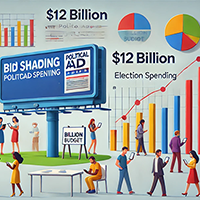Decoder
-
Decoder
How the EU’s Digital Services Act Promotes Greater Ad Transparency
The EU’s Digital Services Act sets new standards for ad transparency, impacting online platforms and advertisers. Elena Turtureanu, VP, Legal and Privacy Compliance at Adform digs into how the DSA is shaping a more accountable digital ecosystem through key compliance requirements.
-
Decoder
Behind-The-Scenes of Header Bidding and How It Creates Better Ad Quality for Publishers
Header bidding has revolutionized programmatic advertising by allowing multiple demand sources to bid on ad inventory simultaneously, rather than sequentially as in traditional waterfall auctions. This competition results in higher CPMs, better ad quality, and greater control for publishers.
-
Decoder
Dark Traffic Is Costing Publishers 14-21% of Their Revenue – What Is It?
Ad blocking was last decade’s big problem, right? It is no longer seen as an existential crisis; it’s become a back burner issue. Not quite. There’s a new more sinister problem— brutal adblockers that cause dark traffic. There are now 700m+ users globally. Much of this has materialized in the years since COVID-19.
-
Decoder
What Are the Top Data Clean Rooms Solutions?
You must dig deep into each PET solution, to decide which works best for your business goals. For instance, how do you decide which Data Clean Rooms (DCR) fits best? We analyzed to discover seven of the top Data Clean Room solutions to help you find the perfect fit for elevating your business’s data strategy.
-
AI
What Is the Role of AI in Mobile Measurement and Attribution?
Lou Hong, VP of Marketing at Adjust, explores how AI is transforming mobile measurement and attribution, enhancing data analysis and compliance with privacy regulations. Learn how privacy-centric models are reshaping the mobile industry. AI has already begun transforming various aspects of mobile marketing, from personalized recommendations to predictive analytics. As AI technologies evolve, their impact […]
-
Decoder
Dissecting the Android Privacy Sandbox: A Critical Guide for Publishers
Dive into the Android Privacy Sandbox and its profound implications for mobile advertising. Learn about the benefits and challenges it poses for publishers and how it stacks up against Apple’s SKAdNetwork and Ad Attribution Kit.
-
AI
What Should Mobile Marketers Know About the Android Privacy Sandbox Launch?
As Google’s Android Privacy Sandbox gears up for its anticipated 2025 launch, mobile marketers need to stay ahead of the curve. Remerge, a leading Demand Side Platform (DSP), is at the forefront of this transition, collaborating with Google and other ad tech partners, such as Verve, AppsFlyer, Adjust, and Singular, to ensure a seamless shift. Luckey Harpley, Staff Product Manager at Remerge, sheds light on what this means for the future of mobile marketing and how to navigate this new landscape.
-
Decoder
How Bid Shading and the $12 Billion Political Ad Boom Could Impact Publishers
Explore how bid shading in political advertising affects publishers’ revenue, the associated risks, and strategic measures to mitigate these impacts during an election cycle with high political budgets.
-
Behind the News
SCOTUS Overturned the Chevron Deference Precedent…What Does It Mean for Advertising?
No matter where you stand on the political spectrum, it’s hard not to watch the Supreme Court since it established its conservative majority. Now, the dominoes just keep on falling. With the 1984 Chevron Deference precedent overturning, power has shifted away from the executive branch to the judiciary, potentially transforming federal government operations. Consequently, the court’s conservative majority has made many regulations vulnerable to legal challenges.
-
Decoder
What Is AdAttributionKit (AAK): Apple’s Next-Gen Tool for Smarter, Privacy-Focused Ad Attribution?
Explore Apple’s AdAttributionKit, the innovative framework transforming ad attribution for app publishers. Learn about its features, how it compares to SKAdNetwork, and its impact on ad performance and privacy compliance in mobile monetization.









